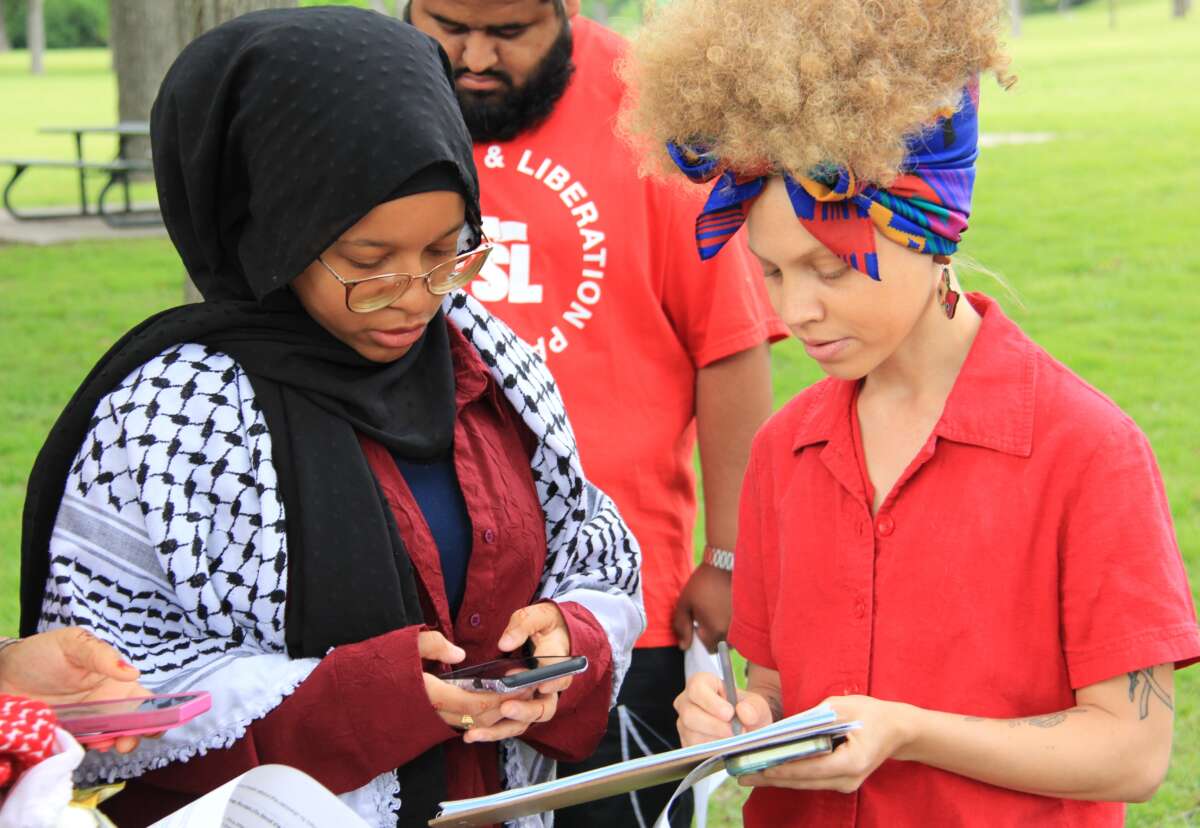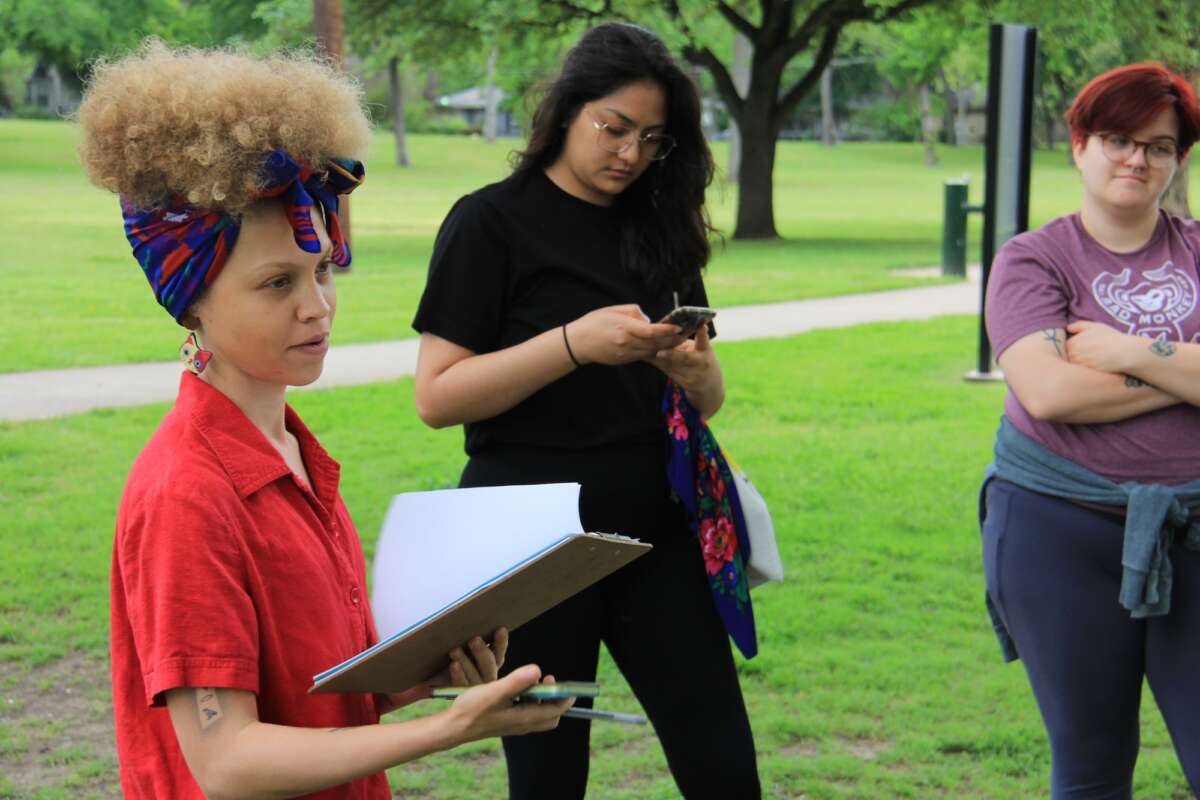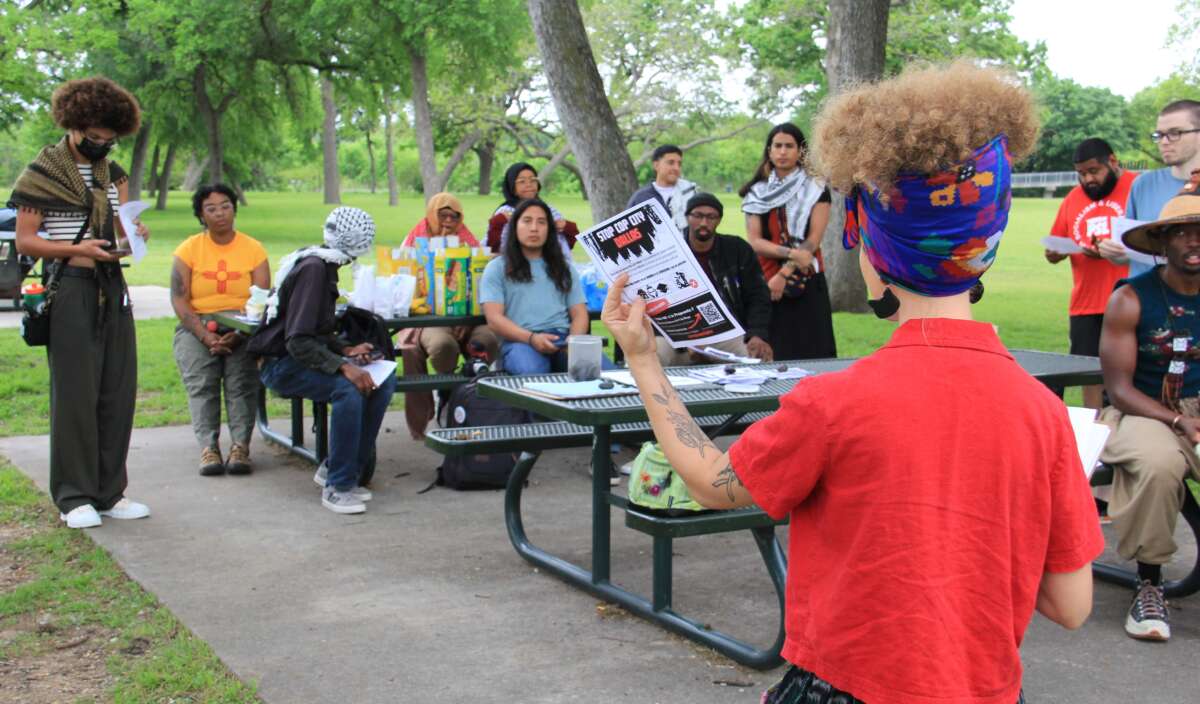Dallas, Texas—On a balmy, overcast morning in South Dallas, more than 20 organizers slowly trickled onto the playground benches at Glendale Park. Armed with snacks, flyers and canvassing scripts, they soon paired off and headed to their respective neighborhood turfs for the day.
Their goal? To let their neighbors know that a new $150 million police training center, or “Cop City Dallas,” is being planned for the University of North Texas at Dallas (UNT) campus, and that they still have a chance to stop it by voting against Proposition F, which would dedicate at least $50 million taxpayer dollars toward the project, in the May 4 bond election.

In addition to the potential bond package, the new regional police training facility, which city officials hope will break ground in 2025 and be completed by 2027, has already received a $10 million grant from the Communities Foundation of Texas and at least a $20 million commitment from the state legislature in 2023. As the Dallas Morning News reports, the city “hopes to obtain the rest through private funds and charitable grants,” including potential corporate backing. Under a 40-year contract, The Dallas Weekly notes, the lease for the facility on campus would cost the city just $1 a year.
The proposed Cop City compound would cover five acres next to the campus’s park, with another 20 acres nearby designated as a simulated urban environment where the Dallas Police Department (DPD) and other area police forces can role play policing scenarios. This feature, especially, is why North Texas organizers are tying their struggle to the ongoing fight against Georgia’s Cop City, which is currently under construction in unincorporated DeKalb County.
Atlanta organizers have experienced years of intense police-perpetrated repression and violence since their movement first formed in 2021, including the 2023 fatal police-perpetrated shooting of Manuel Paez Terán (also known as Tortuguita), the first environmental protester killed on United States soil; SWAT-style raids on several organizers’ homes; and more than 60 charges under Georgia’s state-level Racketeering Influenced and Corrupt Organizations (RICO) and domestic terrorism statutes. Nonprofits filed a petition this month asking the Inter-American Commission on Human Rights to rule on Terán’s killing.
“I firmly believe the rollout of this bond election has been poor on the city’s part, and I question if that is intentional. There’s a lack of transparency around each proposition that city of Dallas residents are voting on.”
Stop Cop City Dallas organizer and East Dallas resident Tamera Hutcherson told Truthout she helped start the Stop Cop City Dallas coalition about two months ago. She is helping to organize a canvassing and phone banking campaign against the training facility not just to push back against new policing infrastructure in a predominantly Black and Brown district of Dallas, but also because the language of the $90 million “public safety” bond proposition itself is too vague. Additionally, she says, city officials have failed to hold town halls about the broader $1.25 billion bond package, in which voters will approve taxpayer dollars for everything from street infrastructure and parks projects, to storm mitigation and increased funding for libraries.
“I firmly believe the rollout of this bond election has been poor on the city’s part, and I question if that is intentional. There’s a lack of transparency around each proposition that city of Dallas residents are voting on, in terms of what is actually under each of those propositions, including like an itemized list,” Hutcherson told Truthout. “For me, I see that as an issue [for] a voter because I’d like to know what I am voting on.”

The Stop Cop City Dallas coalition includes several local peace and justice groups, including the Dallas Fort Worth Anti-War Committee, Mothers Against Police Brutality, the Dallas chapters of Jewish Voice for Peace and Democratic Socialists of America, and the National Alliance Against Racist and Political Repression. The new campaign is also drawing in celebrity support. At Glendale Park, stand-up comedian and actor Amanda Seales joined Hutcherson and local organizers during a weekend canvassing effort, helping shine a spotlight on the campaign while on tour in the Dallas area.
“I find it really imperative that we elevate grassroots organizations, and whenever I’m in any city, I make it my business to try and bring any organizers that I can get in touch with onto the stage at the end of my shows to talk to the audience about the work that they’re doing, and how the audience can get involved,” Seales told Truthout at Glendale Park.
Councilmember and Mayor Pro-Tem Tennell Atkins, who is backing the planned project in his district, told Truthout the facility has been in the works for years, since before the struggle against Atlanta’s Cop City emerged and even prior to the George Floyd protests and uprisings in 2020. Like other city officials, he pointed to local crime rates and called the state of the city’s current training facility, which the new facility would replace, a “disgrace” and a “crying shame,” citing its dilapidated conditions.
“I’m just trying to figure out the comparison with Atlanta. We need to look at what Atlanta is doing versus Dallas. I mean, they’re two different animals,” Atkins told Truthout, adding that Atlanta’s Cop City is mostly backed with private funds. “I don’t know what the issue is. I’m kind of blindsided because I don’t know what is the issue.”
Local organizers point out that $611.9 million has already been put toward policing in Dallas in the 2022-2023 budget despite steady drops in police staffing numbers in recent years. Violent crime, including homicide, continues to drop this year compared to 2023 in the Dallas/Fort Worth area, proving, they say, that the city doesn’t need to put even more resources into policing infrastructure.
In 2020, a federal judge issued temporary ruling against the DPD in response to a lawsuit from protesters subjected to so-called “less-than-lethal” crowd control tactics during that year’s George Floyd protests. When asked about the ruling and DPD’s track record of misconduct, Atkins pointed to the Dallas Community Police Oversight Board, which Dallas-based police accountability activists have criticized as largely toothless.
Moreover, despite his attempt to distance Dallas’s new policing facility from Atlanta’s, Mayor Pro-Tem Atkins trotted out the very same argument that Atlanta city officials have used to attempt to delegitimize the local opposition movement: namely, the bogus “outside agitator” narrative. “They don’t even live in District 8,” Atkins told Truthout of the canvassing organizers, who are North Texans. Organizers say local District 8 residents have been largely receptive to their canvassing campaign so far.
North Dallas resident and canvass organizer Baiyinah Abdullah cast doubt on arguments Atkins later made at Glendale Park. “They say that their facilities are aging, and that they need money. But they also say that they have fantastic training with the facility that they currently have. So for me, there’s a logic issue there — because if they have what they need, right, then why do we need to give them more?” she told Truthout. “And if we give them more, what exactly are they going to use it for? And also, why are they building it on a college campus? They’re also phrasing it as a regional training facility, which means that there are going to be … other police departments involved. And so we don’t know the full scale of this.”
Hutcherson, Abdullah, and other organizers say they want the $50 million in bond money dedicated to the new training facility to instead go toward priorities that reduce poverty and support the local community — thus creating the conditions for true public safety. Those priorities include alternative first response for people suffering acute mental health crises such as Austin’s Community Health Paramedic program, which dispatches mental health counselors with Integral Care’s Expanded Mobile Crisis Outreach Team, as well as larger investments in affordable housing, education and health care.
“Why are we spending for this bond election more money towards policing when we know Dallas is becoming harder to live in terms of inflation, higher costs of rent, and the city’s inability to provide the resources needed to assist our houseless community?” Hutcherson told Truthout. “Also, in regards to gentrification, we’re pushing out long-term community residents that have been here for generations. There are so many other ways the city could be using this money instead of policing.”
“There are so many other ways the city could be using this money instead of policing.”
The state legislature’s passage of House Bill 1900, which penalizes municipalities for trimming local policing budgets, stands in the way of the coalition’s demands to reallocate policing funds. Rather than pushing defund campaigns, community activists must now work to ensure budgets do not increase. Proposition F, they say, has already done just that.
Organizers also pointed to the recent case in which four DPD officers were caught on video laughing at Dynell Lane, a disabled military veteran who urinated on himself after being refused access to a restaurant restroom. “DPD, the Dallas County Sheriff’s Office and all of the other policing entities in this area [have] shown us time and time again that whether it be in their jails, within the carceral system, or whether it be on the streets with everyday citizens, that they do not keep us safe, and that they are not willing to do what it takes to actually treat citizens like people,” Abdullah said.
Dallas’s proposed training center is far from the only new Cop City cropping up across the country. Researcher Renee Johnston has mapped at least 69 proposals for similar police training facilities across the U.S. — the vast majority of which were proposed, or began construction or expansion, following the George Floyd uprisings of 2020. The planned projects range in cost from just under $1 million to $415 million, and in size from as small as 3 acres to as large as 146 acres. Moreover, these proposed facilities are often backed by private police foundations and police associations without input from the public. Only Wyoming, North Dakota and Vermont are currently free from plans for a new Cop City.
Johnston notes that at least three Cop City proposals currently surround Minneapolis, where residents set fire to the Minneapolis Police Department’s Third Precinct building during the 2020 uprising. She documents five other cities in which training facility proposals had been discussed prior to 2020, but also notes that the 2020 Floyd protests likely provided necessary impetus for the projects to finally move forward.
“A few of them, of course, when you do the reading, they’re like, ‘Oh we’ve been talking about this for a decade, we’ve been talking about this for years,’ but one must wonder to themselves like: If you were talking about it for years why all of a sudden in 2021 did it end up on your city council meeting?” Johnston said during a webinar about planned Cop Cities. “I am fully convinced that this is all just part of the state really striking back and saying: The working people of this country had the audacity to rise up together in response to what policing was doing in this country, and we need to make sure that we’re prepared for that not to happen again.”
Dallas city officials’ excuses for why the new facility is necessary aren’t unlike those for dozens of others across the country. Justifications usually include a lack of space, aging buildings, a desire to modernize, and the supposed need for more training. More than a few of the proposed sites include repurposed school buildings or college campuses, Johnston notes.
“What I really hope is that people can look at this and see that there is something to be concerned about. This is, to me, horrifying to see that these things are being built all across the country,” she said during the webinar. “People should be thinking about how big these facilities are. What is it doing to the environment to build these huge shooting ranges and driving ranges and all of these things that they’re tearing apart [in the] natural landscapes in order to do?”
“As with all the Cop Cities that are planned, I feel like it is really concerning the way that government is looking to govern its own citizens. Cop City is not about protecting the people. It’s about protecting property, and it’s about militarizing this nation.”
But as Cop City proposals proliferate across the country, attorneys and organizers are also pursuing legal pathways for challenges. National Lawyers Guild (NLG) Director of Mass Defense Xavier T. de Janon tells Truthout the NLG is providing legal support and resources to local organizers eyeing potential challenges. For example, NLG members have been supporting efforts to delay or block a planned facility in Lacey, Washington, he says.
“There has been a lot of discussion on what other routes to fight these projects are, as have happened in Atlanta. That looks like lawsuits or EPA [Environmental Protection Agency] considerations, or using basically government processes to slow it down because there is always a way to appeal. Even if a ballot passes, something can happen in the courts to fight. So that’s also something that our members are brainstorming,” de Janon told Truthout. “A lot of these projects happen so quickly or behind closed doors. In Dallas, it just happened to be public for the vote, but not the planning. So there might be ways that permits can be questioned, or all the little things that it takes to build something could be challenged.”
Comedian and actor Seales also linked the fight against Dallas’s Cop City to proposed projects across the country. “As with all the Cop Cities that are planned, I feel like it is really concerning the way that government is looking to govern its own citizens. Cop City is not about protecting the people. It’s about protecting property, and it’s about militarizing this nation in a way that many people do not want to see happen and that won’t feel safe,” Seales told Truthout.
Angry, shocked, overwhelmed? Take action: Support independent media.
We’ve borne witness to a chaotic first few months in Trump’s presidency.
Over the last months, each executive order has delivered shock and bewilderment — a core part of a strategy to make the right-wing turn feel inevitable and overwhelming. But, as organizer Sandra Avalos implored us to remember in Truthout last November, “Together, we are more powerful than Trump.”
Indeed, the Trump administration is pushing through executive orders, but — as we’ve reported at Truthout — many are in legal limbo and face court challenges from unions and civil rights groups. Efforts to quash anti-racist teaching and DEI programs are stalled by education faculty, staff, and students refusing to comply. And communities across the country are coming together to raise the alarm on ICE raids, inform neighbors of their civil rights, and protect each other in moving shows of solidarity.
It will be a long fight ahead. And as nonprofit movement media, Truthout plans to be there documenting and uplifting resistance.
As we undertake this life-sustaining work, we appeal for your support. We have 9 days left in our fundraiser: Please, if you find value in what we do, join our community of sustainers by making a monthly or one-time gift.
